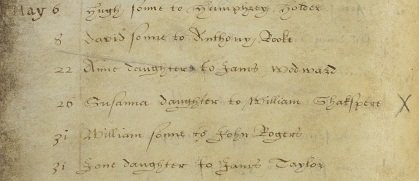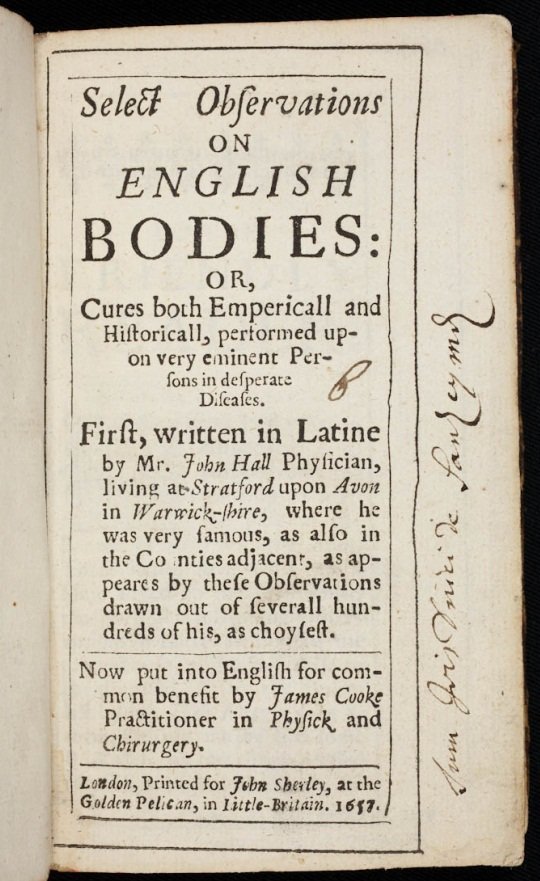
Susanna Shakespeare was baptised on 26th May 1583, six months after her parents’ marriage. Shakespeare was barely 19 at the time. She was only four or five years old when her father started work in London. Academics tend to believe she was educated and literate, she could at least write her name and is thought to have composed the memorial epitaph to her mother. Her childhood was full of incident, in 1594 there were fires in Stratford which damaged the family’s home on Henley Street, two years later when she was aged 13 Susanna’s younger brother Hamnet died. In 1598 William Shakespeare purchased New Place and the family moved there.

The Physician, John Hall, settled in Stratford in about 1600 and set up his medical practice at the age of 25. It quickly became the most respected practice in the area. Born in 1575, he was a middle class professional with a rising career, he was also a Puritan. Susanna appeared to have Roman Catholic sympathies as in 1606 when she was 22 she was one of 21 people in Stratford charged with not taking Communion on Easter Sunday. Following the Gunpowder plot to blow up Parliament and kill the King failure to receive communion on great festival days was seen as an act of resistance by Catholics. The case against her was dismissed so it is assumed that she complied with the law and accepted Communion after this. John Hall lived at Hall’s Croft, not far from New Place and had a practice and apothecary shop there. John’s father was a doctor and it is from him that he may have learned much of his medical skill.
Susanna and John were married at Holy Trinity Church on 5th June 1607, their only child, Elizabeth, was born on 21st February 1608. It is believed that they moved into Hall’s Croft as soon as it was built in 1613. Here Hall conducted his practice as a physician. John Hall’s casebooks included ailments and treatments for Susanna and Elizabeth and as such provide a fascinating insight into their life together, for example Susanna was “tormented with the Cholick” and Elizabeth had erratic fever “Sometimes she was hot, and by-and-by sweating, again cold, all in the space of half-an-hour.” Her father’s treatment healed her “the symptoms remitted daily till she was well for many years.” Unfortunately the case books which survive begin in 1617, the year after Shakespeare’s death so no treatment is recorded for any ailments leading to it, it is thought that John would have tended to him at this time.

In 1614 John travelled to London with William Shakespeare and in 1616 it was his sad duty to travel to London alone with Shakespeare’s will for it to be proved. It is thought that William Shakespeare became good friends with his son-in-law and as such he made John and Susanna the executors of his will and left them the bulk of his estate including “the Newe Place wherein I nowe dwell”. After her father’s death Susanna and her husband moved in to New Place and started to plan the memorial to Shakespeare, the bust in the church which was installed in 1622, one of our main indications of what Shakespeare looked like.
Hall was also elected a burgess in 1617 but attending meetings was difficult with the pressures of his practice. At first he was excused meetings then he was fined and finally he was expelled in 1633.

John Hall died suddenly at the age of 60 on 25th November 1635 and Susanna became sole mistress of New Place, it is possible that she continued her husband’s work in the role of a ‘wise woman’ as the widows of medical men often did. Her daughter, Elizabeth, and her husband, Thomas Nash, moved in with her.
In 1643 Susanna received two notable visitors, one was the surgeon James Cooke who bought Hall’s casebooks which he later edited and published in 1657 as Hall’s Select Observations on English Bodies, these contained treatments for John himself, Susanna, Elizabeth, and the poet Michael Drayton. The other was Queen Henrietta Maria, wife to King Charles I, who stayed in Stratford for three days bringing with her a thousand horses and a hundred wagons. She was a guest at New Place. The Queen was a keen theatre enthusiast and will have wanted to learn about Shakespeare. After the visit Susanna sent the Queen a book which is now one of the treasures of our collection. It is an English translation of a tirade against Queen Catherine de Medici for her involvement after the St Bartholomew Day’s Massacre. Catherine was Henrietta Maria’s grandmother so it was an interesting choice of book to send to her. Susanna died on 11th July 1649 aged 66.

Susanna died on 11th July 1649 aged 66.
Her epitaph reads
“Witty
above her sex, but that’s not all,
Wise
to salvation was good Mistris Hall,
Something
in Shakespeare was in that, but this
Wholy
of him with whom she’s now in bliss.
Then,
Passenger, hast nere a teare,
To
weepe with her that wept with all
That
wept, yet set her self to chere
Them
up with comforts cordiall.
Her
love shall live, her mercy spread
When
thou has’t ner’e a teare to shed.”
Sources used:
